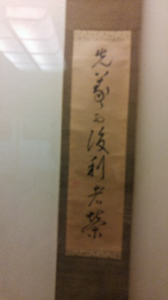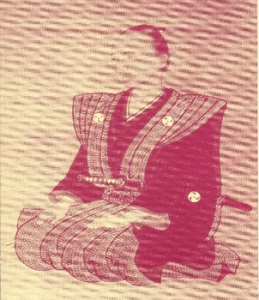The world’s most advanced marketing was in Kyoto during the Edo period! The world’s most advanced philosophy and value axis is Sekimon Shingaku (Prioritize ethics and put profits on the back burner.) (from the Edo period).
Yoshie Doi

Baigan Sensei Scroll from the Edo Period Prioritize ethics and put profits on the back burner (owned by Hanbei Fu Honten) |
 Ishida Baigan Sensei |
Since last year, I have been attending a series of seminars on marketing, which I am not good at, in order to make Kyo-Suzume leap forward. In addition to seminars on history and culture, I have been taking a series of marketing seminars that have no interest in me in order to expand the scope of Kyo-Suzume’s future activities. All seminars are conducted by the world’s top consultants. Since 2020, during the coronavirus pandemic, I have attended seminars on web from Jay Abraham, Dan Kennedy, YUKI, etc., and have attended dozens of seminars from the United States and France on zoom, and I want to turn a crisis to a chance. I am listening to the lecture. The content I heard from the world’s top people was from a completely different perspective, and some of the content had not yet been translated into Japanese, so I was excited and nervous as I took each class.
It is said that the information we can get in Kyoto is one-hundredth of that in Tokyo, and the information we can get in Japanese is one-hundredth of that in English.
In such a situation, I am very grateful to be able to attend seminars online while staying in Kyoto. However, the time difference makes it difficult for the organizers. The students are also very serious about their assignments, check items, and homework before taking the course. It was a three-year period in which that spirit was transmitted through the screen and motivated me. The marketing seminar I took last year was especially moving. After taking the course, I learned that the secret to success is how to live and how to live your life.
This is a wide variety of seminars, including culture, history, marketing, economic conditions, and world affairs. What shocked me was that even though it was a marketing seminar, it covered everything from how to live a life-changing way of life, the secret to success, raising awareness, how to change our perspective, how to use our time, how to think for success, and the study of success. In “Scientifically elucidated ways to turn ourselves into a successful person,” the seminar began with the theme of how to create a successful mindset. The lecture progressed while presenting the scientific basis and quantum physics to explore the secret of success from cutting-edge quantum physics. Suddenly, I realized that this was the same philosophy as Professor Baigan of the Edo period.
that’s right. The answer lies in Sekimon Shingaku from the Edo period. His philosophy was exactly the same as that of Sekimon Shingaku, which was born in Kameoka, Kyoto and later opened in Kyoto. At the seminar, we learned that the strategy for success in life is to start with the small things we can do. In other words, the world’s most cutting-edge marketing is saying the same thing as about 300 years ago: There is something to be learned that we never noticed before. Just in October 2000, the “270th Anniversary Symposium of Shingaku” was held at the Kyoto International Conference Center. At that time, Mr. Kazuo Inamori of Kyocera was also a panelist, and Shingaku, who preached “honesty, frugality, and hard work,” passionately talked about the social mission of accumulating “Prioritize ethics and put profits on the back”. Based on the philosophy of “It’s in the other person’s interest, it’s in our own interest,” and in Kyoto, there is an ethical view that says that if we drive out other companies in the same industry and only make profits, we will not last long. He talked about the attitude of business owners who contribute to society through their work.
In addition, Konosuke Matsushita, who founded Panasonic, said that when he promoted people, he chose people who were lucky, charming, and moral.He believed that it was essential for a leader to have moral character.
I heard from current Kyo Suzume staff members about their time supporting equipment development in Silicon Valley. Member come from 16 different countries, and the meanings of words in each country are also different. For example, he anounced that the meeting will start on 9 oclock. It seems that the interpretation is different from Japan, and some people from their countries did not understand that they had to go to the meeting place at the start time. When requesting or communicating about work, he seems to be creative depending on his country of origin. Vocabulary that is most sensitive to words are hero, rules, gentleman, making money, things are done in Japan, and you can drink vodka when you’re done. It seems that the vocabulary that responded to the questions differed depending on the country of origin. Maybe you can understand which country they are from.
Outside of work, he enjoys communicating with equipment developers, device manufacturers, and software-related people from various companies in the semiconductor industry by chatting at restaurants and exchanging opinions. For example, content that has become commonplace these days, such as sending product information from personal purchase information, seems to have been discussed 30 years ago.
According to a recent study, the secret behind Boston’s downfall and Silicon Valley’s sudden success was informal communication and small talk that sparked ideas and led to development, analyzed in A Tale of Two Cities (written by Analy Saxenian). doing. This is exactly the Japanese way of working in the Showa era.
Recently, GAFA’s global companies have banned remote work and made make employees come to work in principle. Remote work has been touted during the coronavirus pandemic, but have people realized that it is by interacting with others that they can demonstrate their strengths and further refine their ideas? I would like to be even more proud of the fact that the Japanese style of working is the most advanced in the world.
I learned a lot from Mr. Hidesaburo Kagiyama, the founder of Yellow Hat. As the saying goes, “Thoroughly done in ordinary things,” he has lived a life of doing ordinary things with extraordinary value, valuing right and wrong more than profit or loss, and placing public interest above personal interest as the criterion. He taught me how to live my own life and how to interact with others.
It was a seminar that made me realize that Japanese-style management is actually the world’s most advanced marketing philosophy, and it was also an opportunity to motivate myself.
The end of document
Translated by Masami Otani
